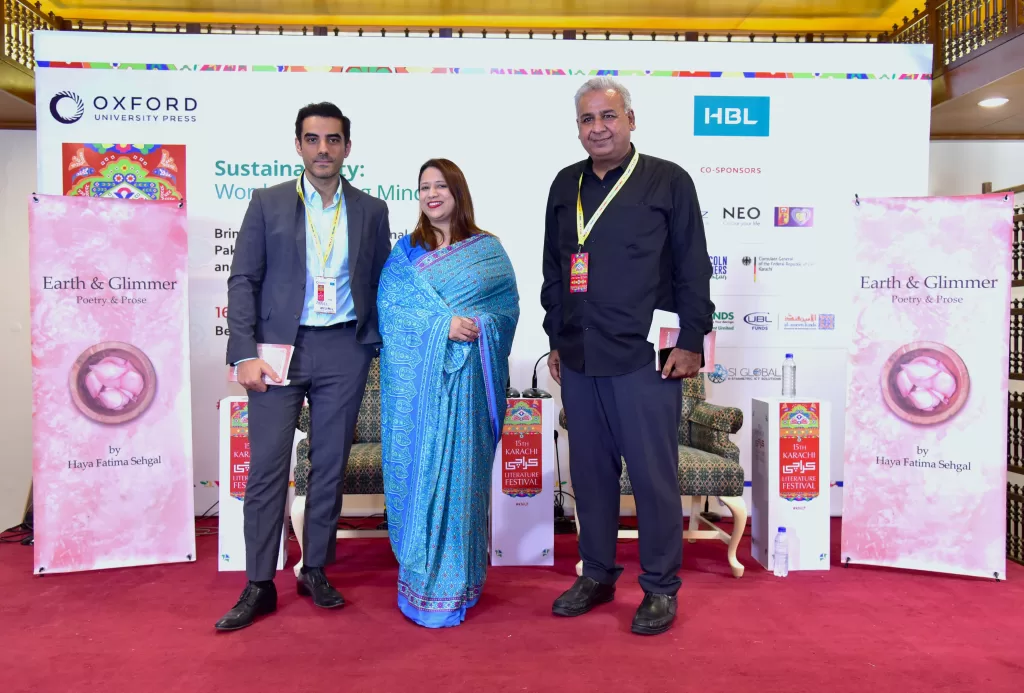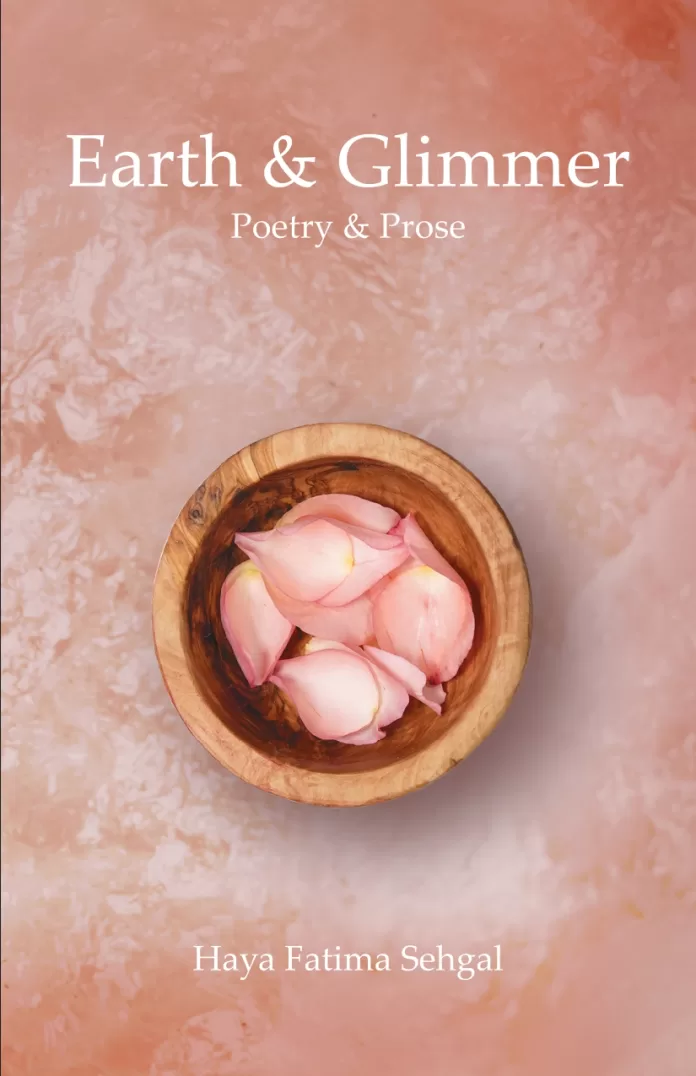Security expert by day, poet and writer by night, Haya Fatima Sehgal explores social issues and cultural dilemmas
Haya Fatima Sehgal is an artist, author and poet who has recently launched two books. Her compilation of articles titled Resilient Pakistan was recently launched at the Quaid-e-Azam House, where she discussed her book in a panel session “Celebrating Jinnah’s Legacy – Resilient Pakistan.”
With the foreword written by Liaquat H. Merchant, Advocate of the Supreme Court of Pakistan and the grandnephew of Muhammad Ali Jinnah, the book has received appreciation from scholars and literati.
A security specialist by profession who has worked in the field for twenty years, Sehgal is also a member of the Jinnah Society, which seeks to promote the values of the founder of the nation.
Her second book of poetry and prose, Earth & Glimmer, has been described as being polemical and the answer to cultural shackles.
“The awareness of writing or being able to put my thoughts in a manner which leant towards a more creative style came in my teens,” she muses. “I have a few poems in Earth & Glimmer, the thoughts for which began back then but the culmination and the completion came much later.”
Sehgal who has also edited and contributed articles for magazines and newspapers feels that her writing styles of poetry and prose are completely different in tone. “But one can tell they are from the same voice,” she says. “In my articles I become an analyst and try to communicate issues that I feel must be openly discussed with the youth of this country. The thoughts that went into the compilation of Resilient Pakistan deal with analysis on the country’s situation.”
Sehgal explains that although Resilient Pakistan initially spoke on the social and cultural impact of values on Pakistan, it developed into much more than that. “There is political analysis and discussion of creating better international relations or global and regional stability with our neighbours,” she shares. “I am a firm believer in peacebuilding values. In fact, one of my sessions at the forthcoming Karachi Literature Festival 2024 will be on peacebuilding ties with India through cultural arts.”
In poetry, however, Sehgal chooses to explore dimensions freely. “My poetry is written in a different manner,” she says. “I call poetry, prose and art a language of love through which I let my readers enjoy magical references and I know that although my writing may come across as blunt and open, I do speak from my heart and don’t hold back anything. Arts allow artists to cross borders and transcend into different worlds.”
The following excerpt from Earth & Glimmers hints at Sehgal being a reflective and appreciative writer who finds deep meaning in small moments, values resilience, and connects with others through shared experiences:
“Serendipity will always be there as well as those moments of happenstances. Those moments that peeked at us from our everyday life. Some people call them ‘Glimmers.’ Others call them by different names. I just know they were the light that gave me the will to live. You already know what they are. It was you living in your morning train of thought. It was passing by your old house where you grew up and nostalgia seeped in. It was the feeling of watching your father reading in the warmth of the sun in the garden. It was there in the kittens you found motherless and then sheltered. It was the friend who called you when you needed that voice, which ended up saving you. It was there when you looked into your bowl of cereal, and you knew there was still life in you. It was looking at you from the ocean expanse as you flew over it that haunted you with its hues. It was something a child said to you that was so profound, it made you ashamed to be an adult. It is the fragrance of a new land that smells different. It was the moment of consciousness of having each other. It was a walk in that garden or even outside your head. It is all a part of you as it happened, in those wonderfully magical moments. Those glimmers that saved us from so much. They are yours, so keep them as precious tokens that have lived you through your journey.”
Sehgal’s poetry has been described as both polemic and political. “There are themes which bring forward and speak about cultural shackles and traditions that I disagree with,” she points out. “Through my poetry, prose and commentary, I endeavour to bring about the bitter realities that exist in South Asia and these must not be hidden away or covered up. Some may even find it difficult to read through poetry about heart-wrenching hard reality. My poetry is written in the open style of modern poetry. Most deal with short form of prose and there are also commentaries given to prompts such as War, Love, Grief and Loss.
The content of Earth & Glimmer is not just meant for women but for the people of the country. “It would be a mistake to let one imagine that poetry is only for women to enjoy,” says Sehgal.
“The poems in Earth & Glimmer speak vastly about the land and the humanity which prevails on this land. And for those curious on why the name ‘Earth & Glimmer,’ I started from where we began, Earth, Water, Air and Fire. I write about all the magic that the loving earth brings to us yet we still remain divided as a human race. I speak of lost love and hope. I speak of my country and its people. I speak of hurt and heartbreak and secrets that the earth and its soil may keep. And I speak of people and places which have passed me by,” she reflects in Earth & Glimmer.

For Sehgal, Pakistan is changing, and in its transformation and wake, there is a subtle movement occurring with attachment to the arts coming out in a wave. “This slow revolution is still at a small stage,” she says. “It is up to the people of the country as to how they will take it forward. Other countries have developed their arts by inviting artists of all kinds to participate, but with us, up until now art is in pockets among select groups of communities. Let’s see if people realise that art must reach everybody, and the groups open up their monopolies to address a wider range of artists from the fields of drama, painting, music and writing.”
Sehgal feels that there is more openness of dialogue now than it has ever been. “Especially with so much happening in our country, I don’t think it is any less,” she shares. “The openness has always been there, but people have access to more information than just a few news channels that were all that there was in the past. The world of social media and digital transformation has changed the landscape of the people in Pakistan. This is where several voices have found the freedom to speak more now than ever before.”
But she quickly adds, “Although, it must be remembered that the transformation is still contained and freedom of speech is not present in the country. There are voices that keep coming out because it is difficult to contain the human need of survival and its search for freedom.”
Talking about the creation of Pakistan, Sehgal points out that it was made to be a safe space for the Muslims of the sub-continent. “The purpose may not have been achieved, because actually is not a safe space for anybody, even though it is our home,” she says. “There are several failings, but it is not a failed state either. Those that keep us in, also keep us safe. It is a conundrum. We have this love-hate relationship with our ruling elite. Everyone understands this especially as we know that we may not have, and perhaps never have democracy as understood or told to us or as promised to us by Muhammad Ali Jinnah. In my book, I also give reasoning in the text as to why our defense mechanisms have become so deep rooted that they are difficult to remove. People are now saying this on podcasts, but I have been speaking about this for several years.”
‘Jinnah’s Pakistan’, a phrase coined by Liaquat H. Merchant in a 2009 speech at a conference has been an underlying theme of Sehgal’s work for several years since she met Mr Merchant who is an expert on the subject. “For my article on Fatima Jinnah I did some research,” shares Sehgal. “Mr Merchant was curious why I wanted to know so much about her. I simply told him the reason for my curiosity was that not much work had been done on her until that time and the series on Fatima Jinnah was made later.”
Through her work, Sehgal seeks to illuminate raw and unfiltered truth. “One can say and utilise words in different ways, but one must be able to bring out the absolute truth,” she says. “One can say many things without being disrespectful but I always try my best to be respectful for any institution or entity.”
Aside from Jinnah’s Pakistan, a few key themes such as women’s empowerment, gender inequality and gender-based violence appear constantly in Sehgal’s work. “There are definitive issues of populist politics which I have huge concerns with as they destroy diplomatic relations with other countries,” she explains. “I also speak openly about curbing extremism. Our country is based on volatility quite a bit with pockets of extremists on the lookout for spots where they can make trouble. Extremism must be carefully studied and rooted out completely.” Her research on this topic is in the pipeline.
Sehgal’s work draws inspiration from the introspective lyricism of Emily Dickinson and the mystical symbolism of Kahlil Gibran. “I remember reading Tears & Laughter when I was young and was mesmerised by Gibran’s writing since then,” she says, smiling dreamily. “Somebody in college introduced me to poems by Emily Dickinson and the one line “I’m nobody! Who are you?” has stayed with me ever since. Perhaps it was then that started it all out for me.”
She believes that it is now time for Pakistan to develop better foreign policies. “One can easily side track issues and concerns and say this was something that was said back in the 1940s so we must not change anything,” says Sehgal. “However, a new world seeks other than what we have set out for ourselves so we must address our strategies in a different manner to sort out trade routes or cultural ties with our neighbours. The idea is not to bring down our defense systems but rather to engage in dialogue with different precepts. Developing our economic ties will become the key for the country’s progress. Pakistan needs to stabilise relations not just with India but with other countries as well.”
As she continues to challenge convention and ignite dialogue, a glimmer of hope shines for a more empathetic and connected world.





